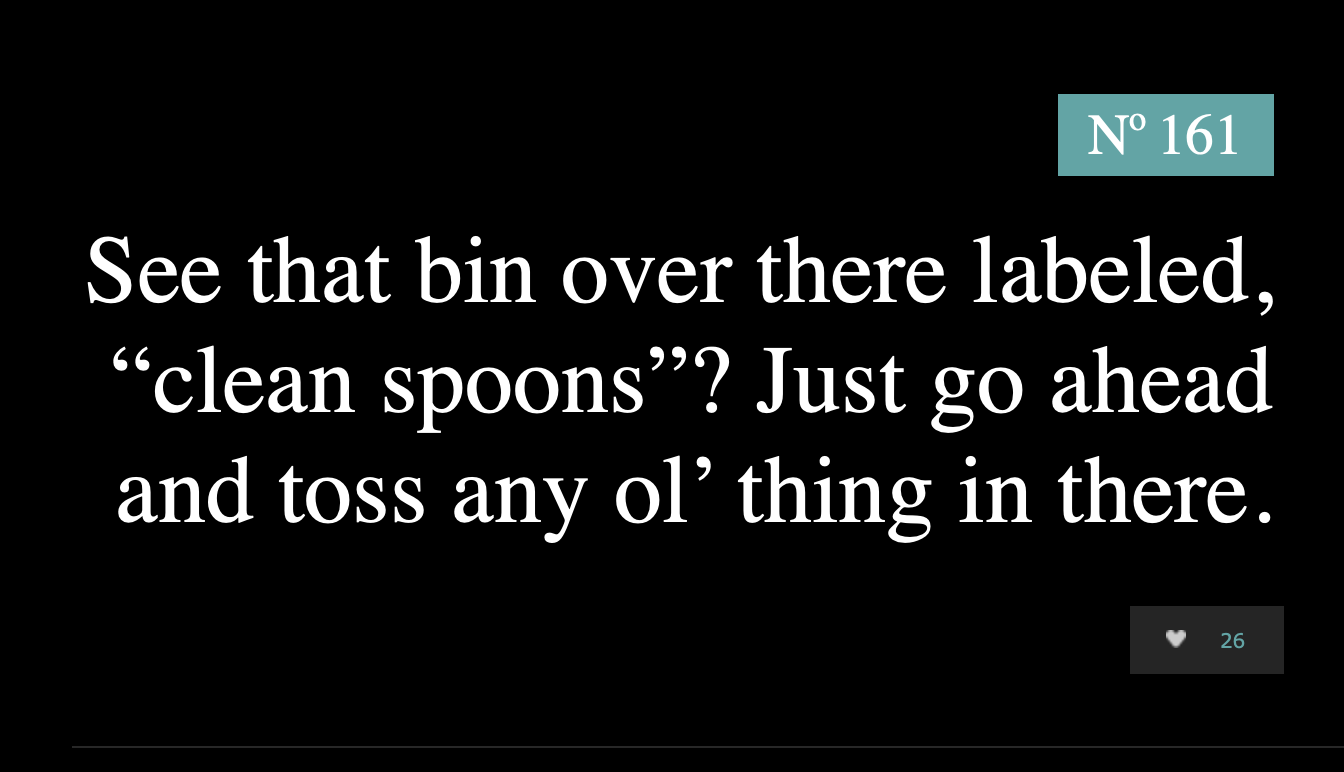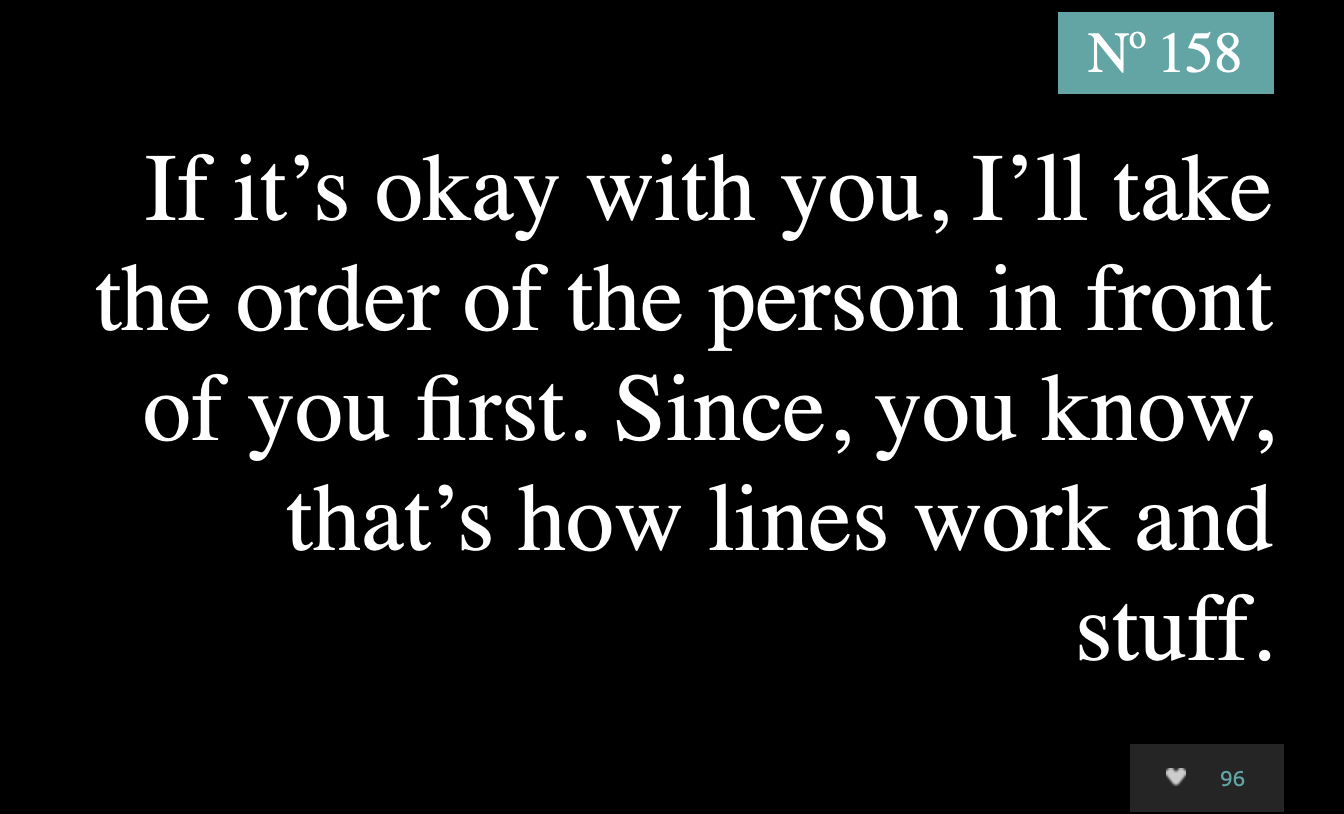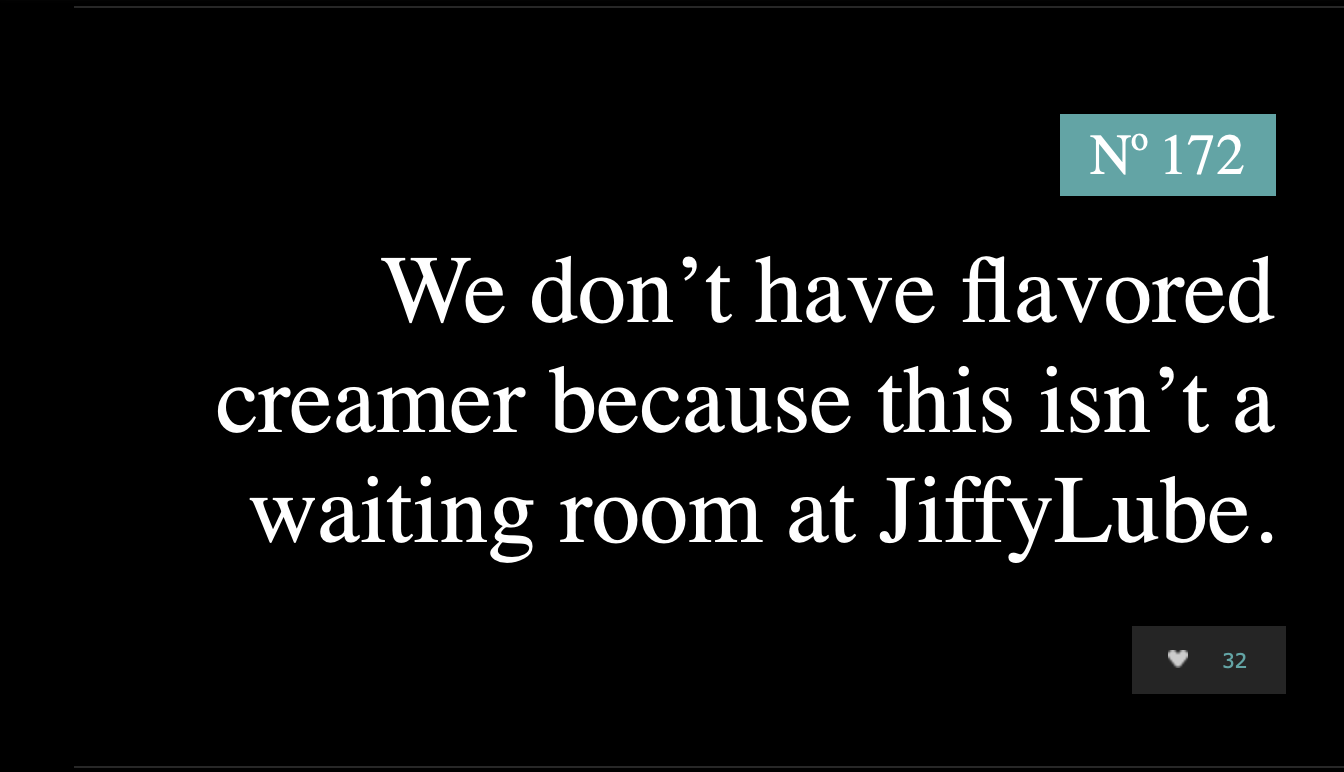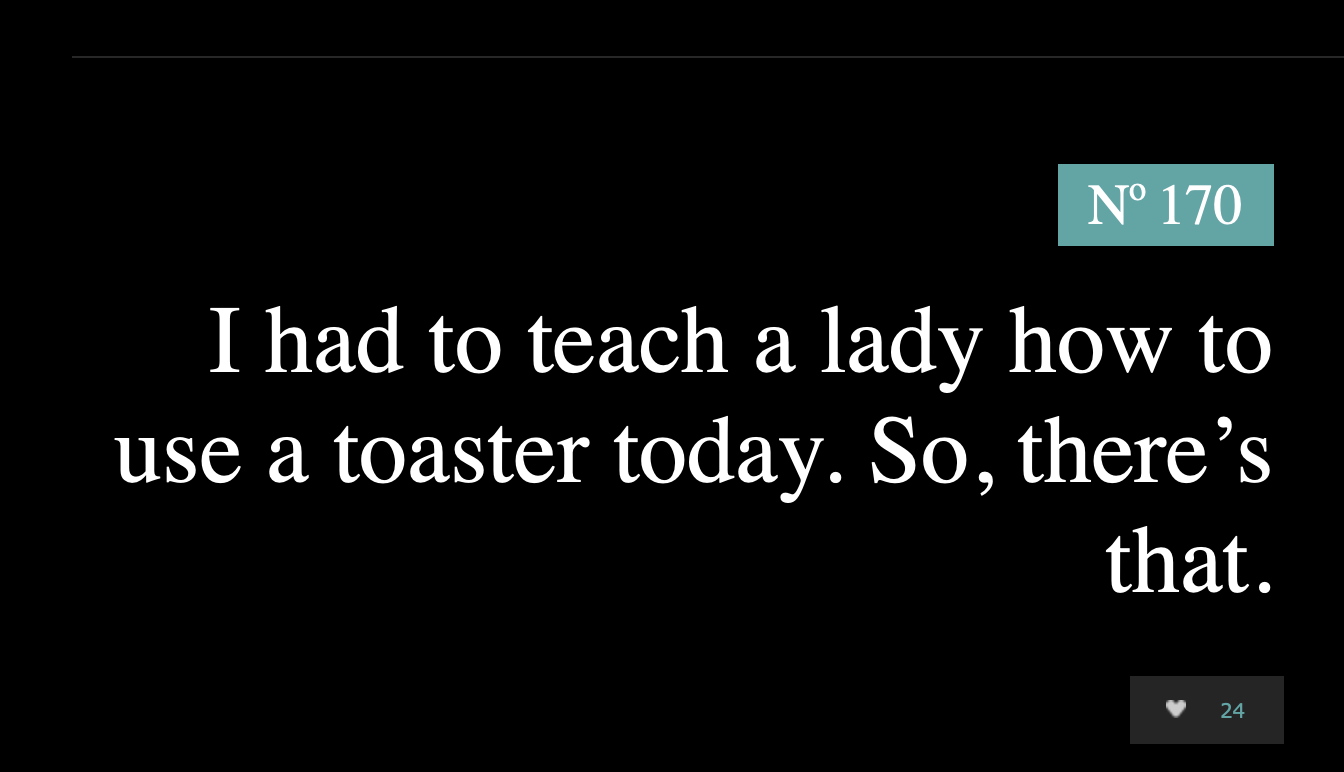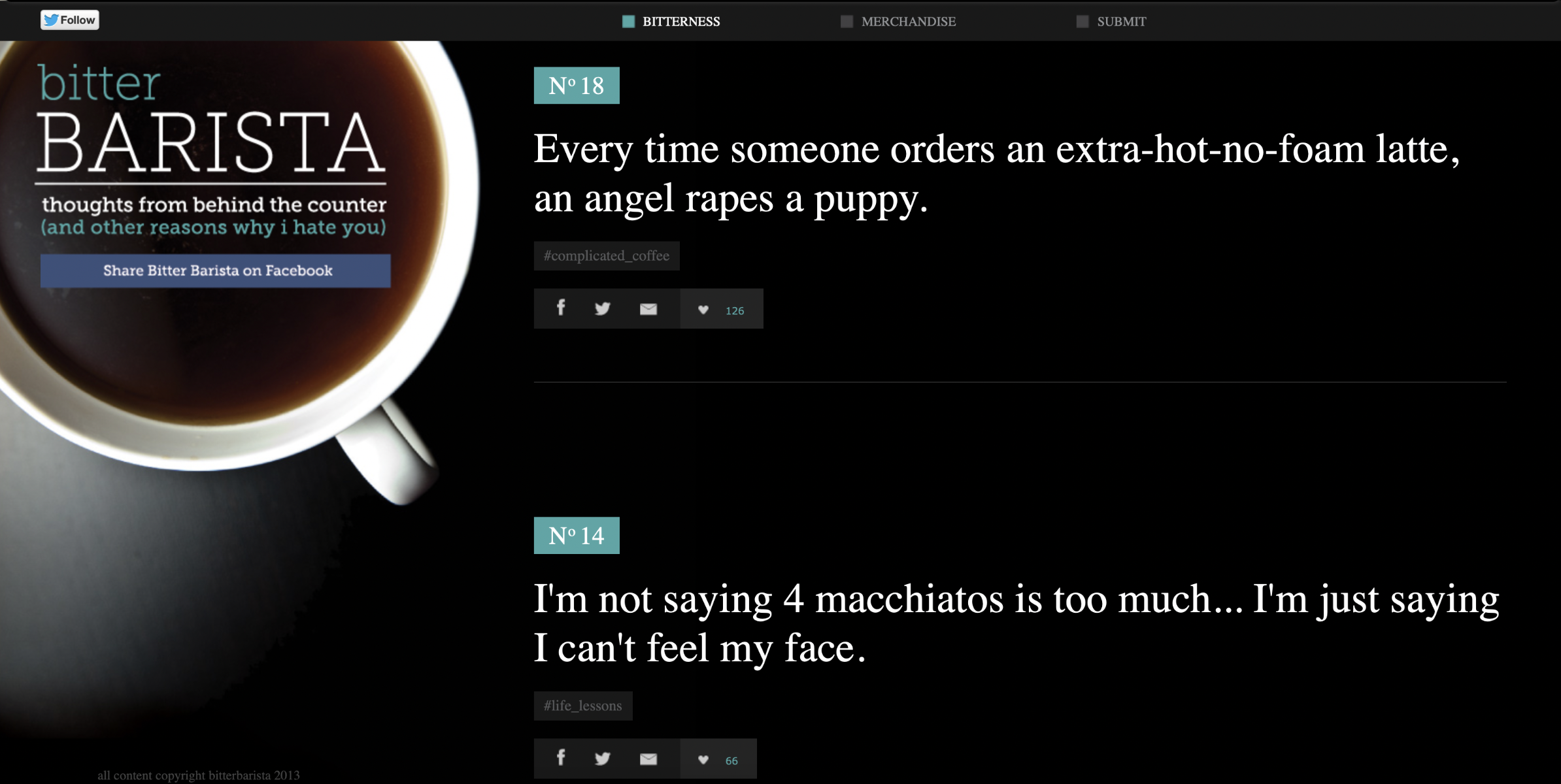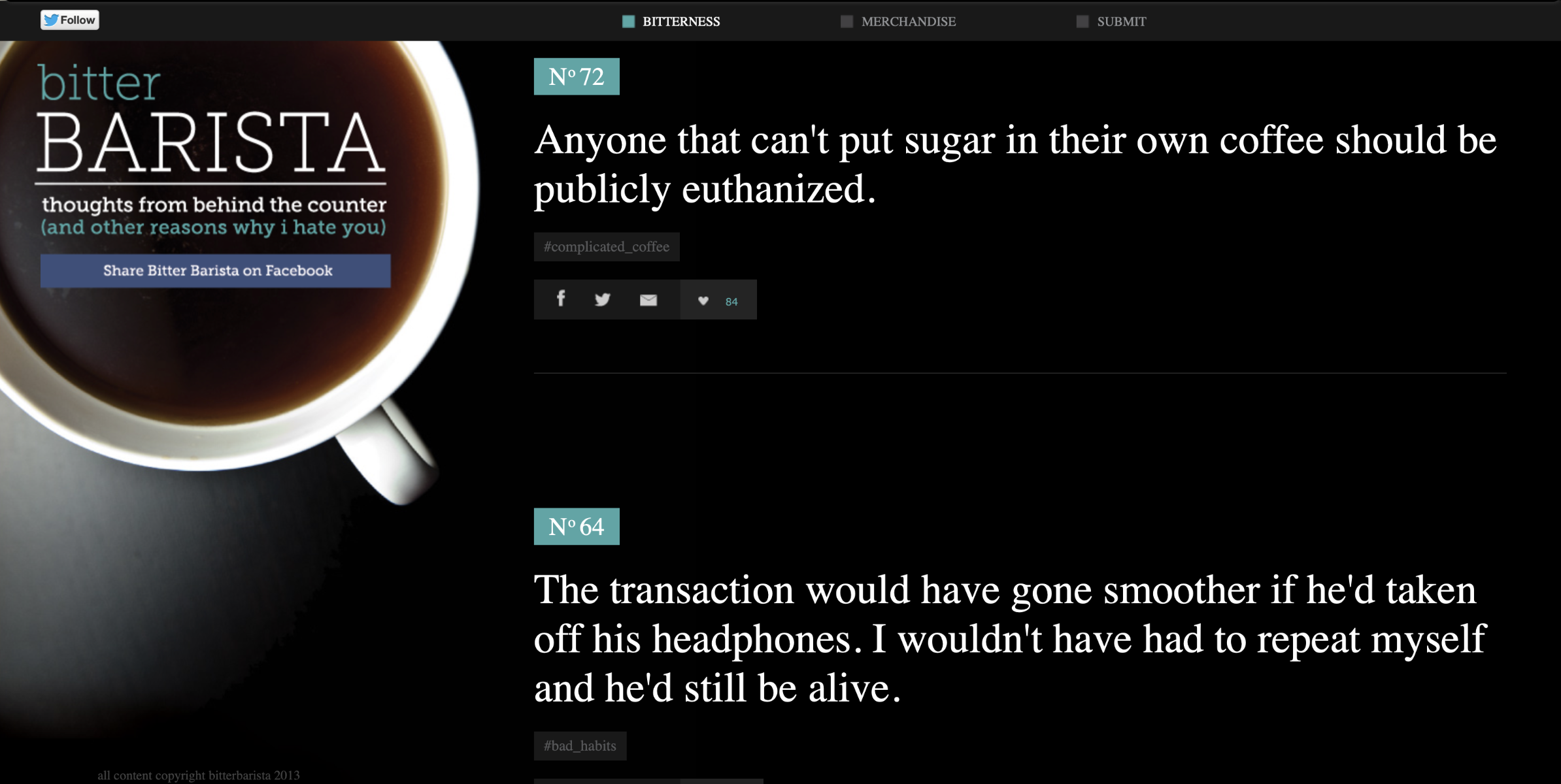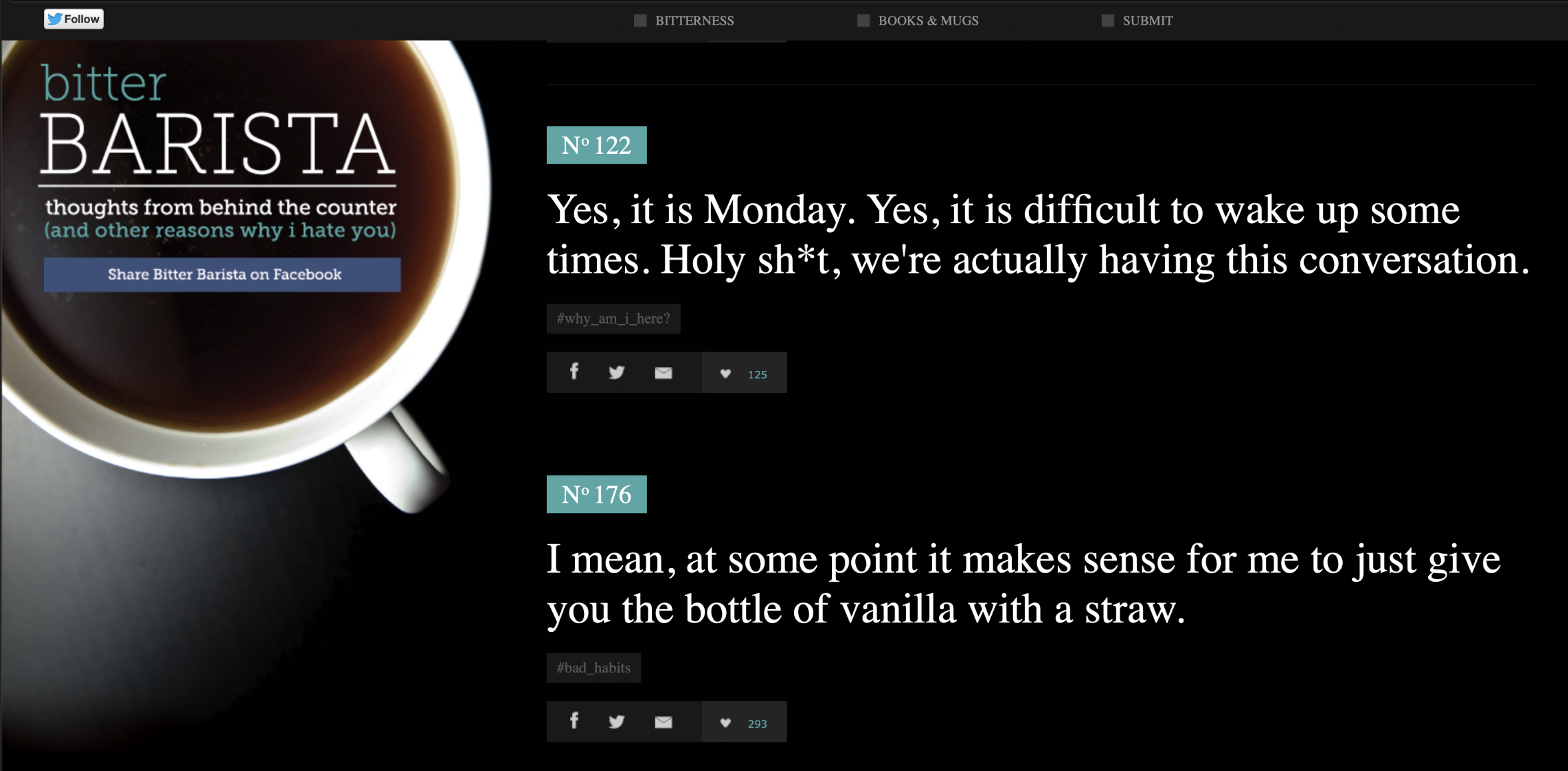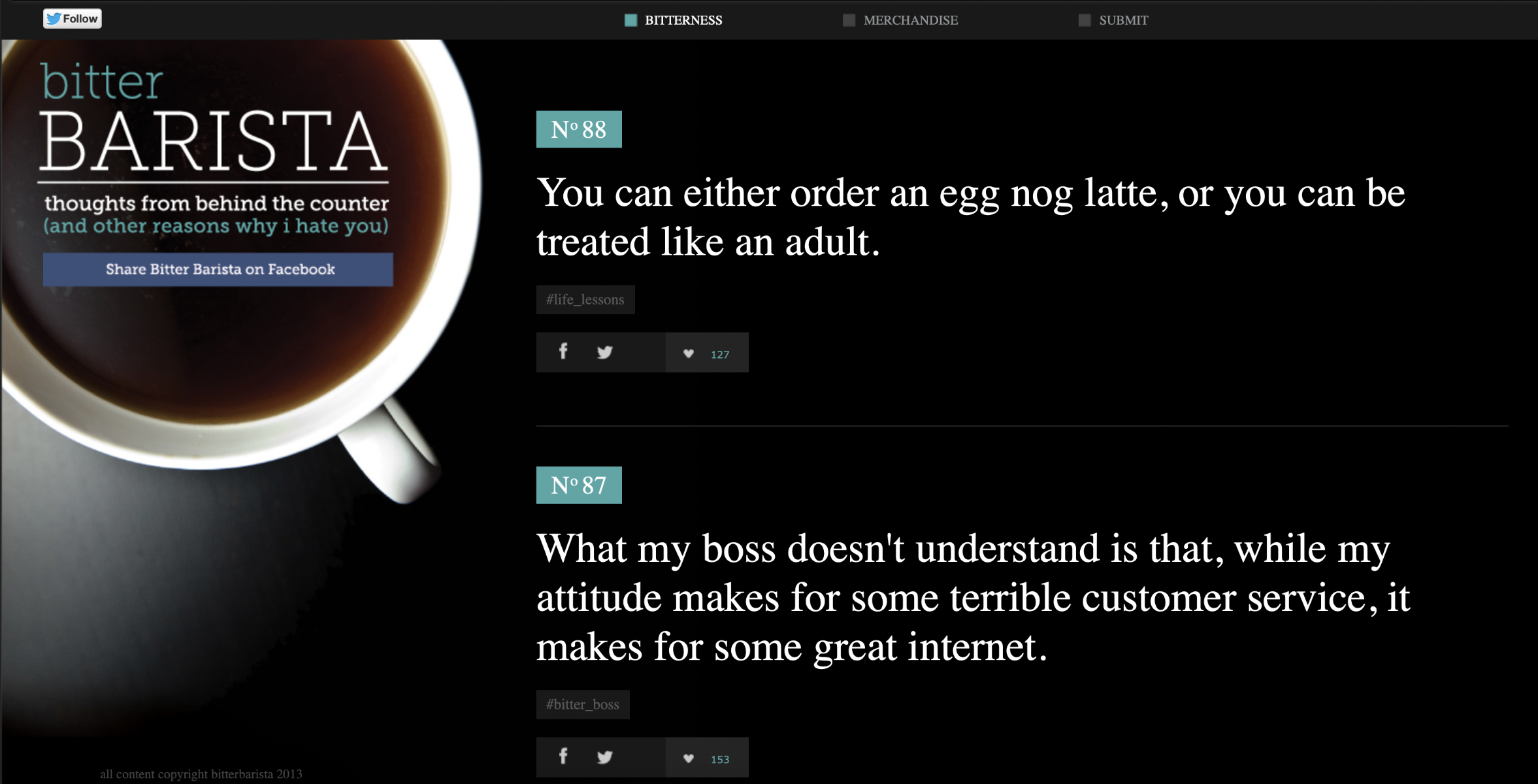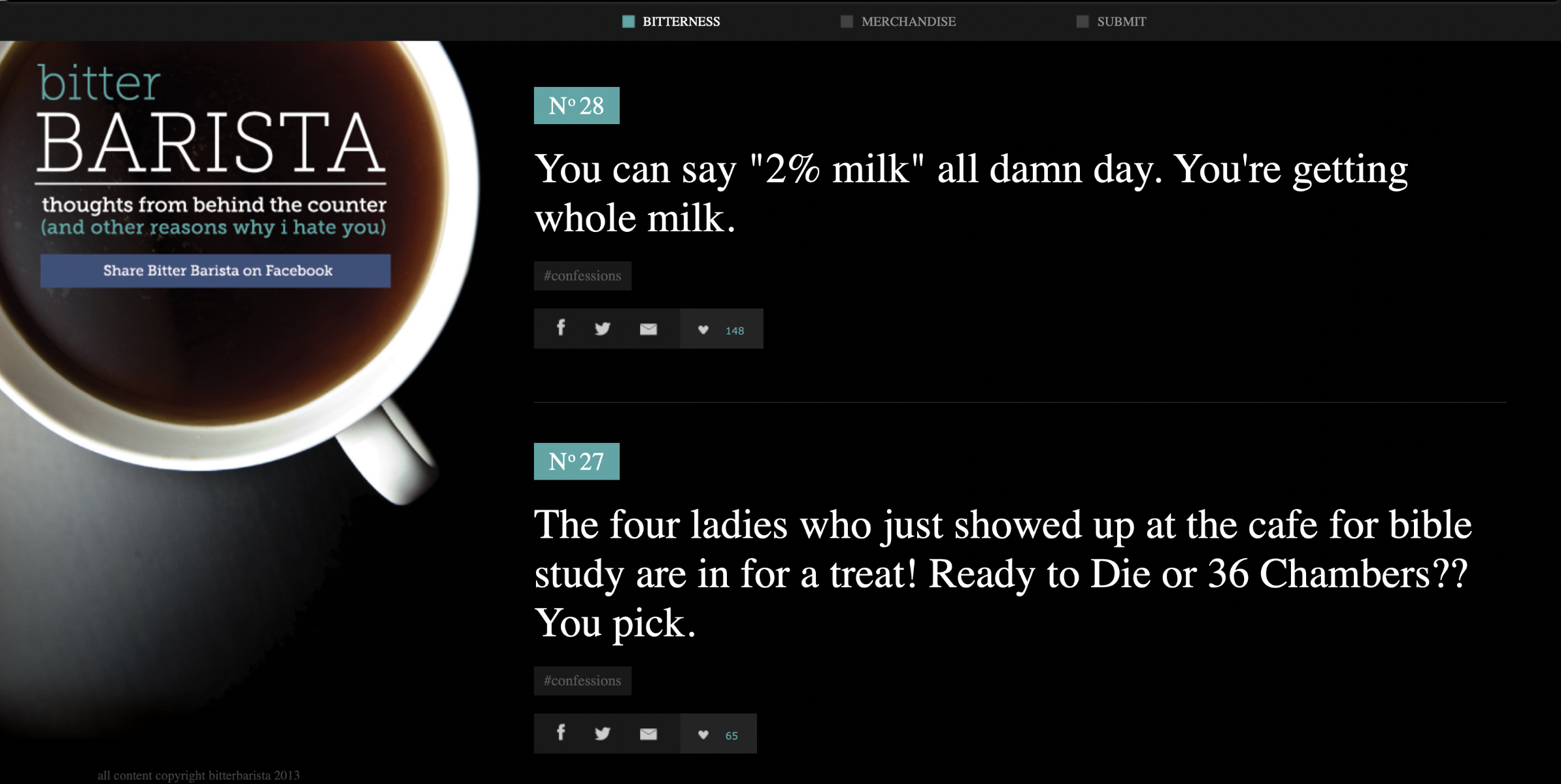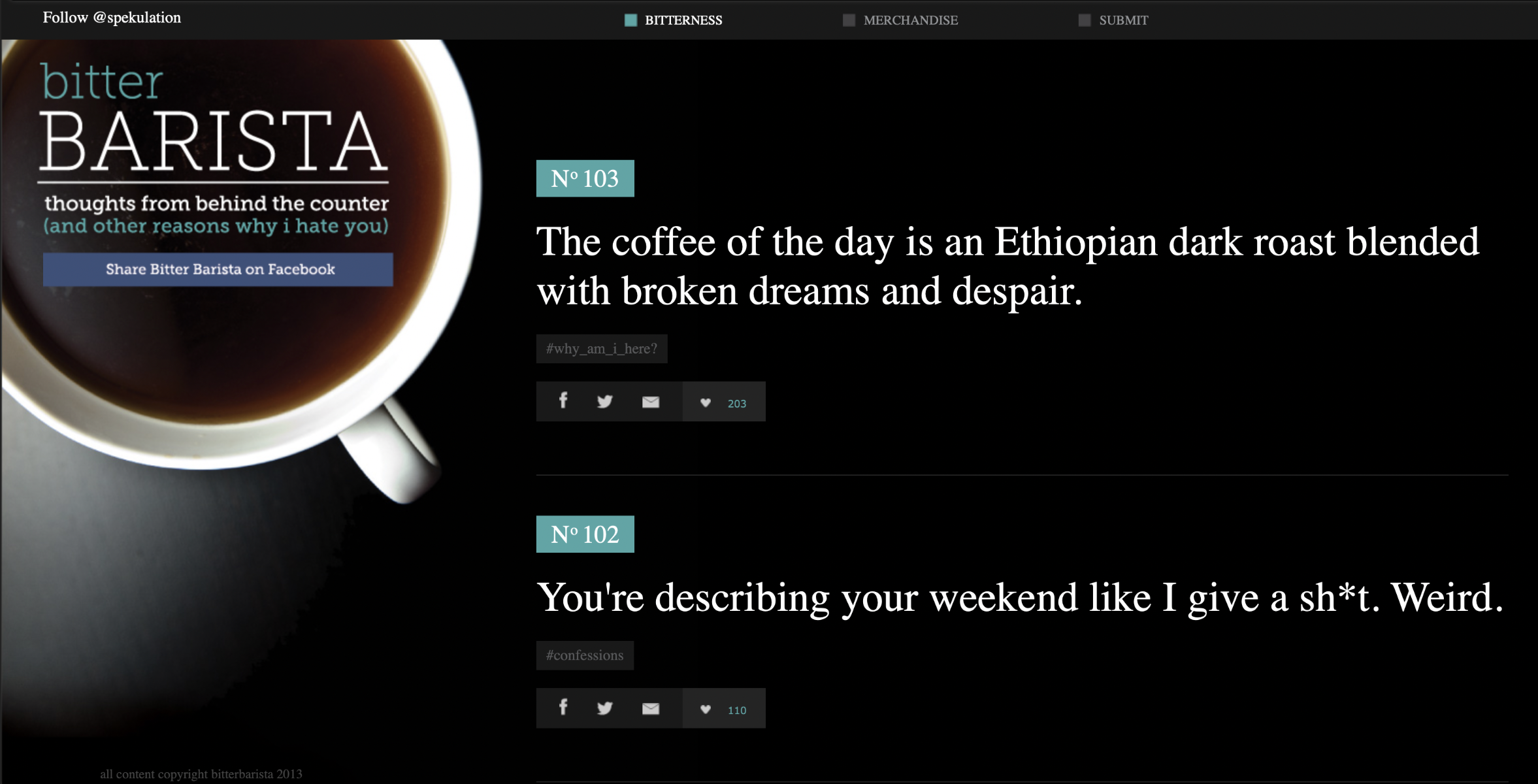“Bitter Barista” and Its Connection To Coffee Elitism
In the early twenty-teens, amidst the rise of third-wave coffee shops, a blog known as "Bitter Barista" became an unlikely nexus of humor and controversy. Its biting sarcasm, encapsulated by posts like "Good coffee is never bitter. But a good barista always is," struck a chord with many in the coffee industry, particularly young baristas navigating their first taste of customer service. Admittedly, some of these posts were funny and still would resonate with baristas today if the blog were still active.
Before we go on, it’s important to note that internet virality worked a bit differently in 2013. Views were the driving force rather than likes and even a post with a dozen likes could dominate algorithms at the time by being reshared on platforms like Tumblr or Twitter. The blog's popularity soared as it churned out content that, while meant to entertain, also underscored the real annoyances faced by the coffee industry. The humor resonated with the younger generation of baristas and was encouraged by a burnt-out lineage of veteran 'spro slingers.
This age group, perhaps already inclined towards a certain brand of nihilism, found solace in the blog's relatable commentary of life behind the counter. Phrases like "Optimistic baristas are not to be trusted; good coffee requires just the right amount of broken dreams and loneliness," became mantras for some, validating their internal monologues of dissatisfaction and shaping their barista identities around this newfound gospel of cynicism.
However, this snarky social commentary would find its widest audience from its most aggressive and controversial posts, and the worst of us began to define the barista in the eyes of the public.
As the page grew in popularity, the posts naturally made their way to the general public, where customers started to wonder if the polite smiles they were greeted with were genuine or if there was a simmering disdain waiting to boil over.
"Barista’s Burden," is a term that came to describe the emotional labor of having to perform a fake cheerful persona, which, as Dr. Alicia A. Grandey's research showed, could have detrimental effects on mental health, including anxiety, depression, and burnout". At a time when we could have focused on addressing the root cause of these issues, we were led to take the pent-up aggression out on the unsuspecting cafe guest.
Moreover, the blog's portrayal risked simplifying the intricate tapestry of barista work into a meme of bitterness, overshadowing the reality of the profession that blends art and technical skill with a dash of psychology. As coffee veterans Samuel Louis Schaefer and Emilia Martinez detailed, “there are healthy coping strategies and managerial practices that can alleviate the pressures of the job".
Being a barista at the height of the Bitter Barista's popularity, I can't help but cringe at the state of the coffee world at the time. My peers had a clear passion for their craft but also a commitment to the bit of being, for lack of a better term, a dick.
Many baristas in 2013 would have thrived in today's coffee landscape but were, dramatically speaking, corrupted by the social norms of the time. Unfortunately, the popularity of blogs like Bitter Barista only worked to create a chasm between coffee professionals and coffee drinkers. Baristas had become a caricature. An elitist 19 year old who would roll their eyes at the sight of a customer pouring half and half into their coffee or giving someone decaf for the sin of placing cash on the counter instead of the hand.
While the "Bitter Barista" blog highlighted genuine workplace annoyances, it also cast a shadow on the barista profession, distilling it down to a stereotype that didn't do justice to the diversity and passion of those behind the counter. Baristas are the face of the coffee industry and the contact point for all the steps that go into a single cup of coffee. When a barista interacts with customers, they speak for the Farmers in the Coffee Belt, the Q Graders, the Roasters and everyone else putting their hearts into creating something great.
This is not to say that baristas should be smiley-faced robots—far from it. Their struggles are real, and they deserve every bit of support and understanding. But the blog, in its broad strokes, painted a picture of customers and baristas alike that simply wasn't accurate. Baristas (mostly) weren't cringe-inducing 12-year-olds fighting over who gets to be the edgiest guy behind the bar, and customers (mostly) weren't bumbling idiots who can hardly tie their shoes, let alone understand the nuances of whatever passed for specialty coffee in 2013.
Matt Watson, or Spekulation as he calls himself, created Bitter Barista for surely innocuous reasons. I highly doubt this was some psyop designed to make the coffee industry worse. Unfortunately, the blog's widespread popularity mostly resonated with youth jaded by customer service, not yet blessed with the media literacy required to separate satire from reality despite a disclaimer encouraging them to not take the blog literally.
Looking back to ten years ago, the coffee industry has come a long way, and being a "Bitter Barista" has fallen out of fashion. But maybe it was a good thing in the long run? Those several years where the coffee world retreated into itself due to negative public perception, brought on by unfriendly baristas, produced some of the greatest innovations and expansion our industry has ever seen. There's no way to tell where we would be today if the face of the industry kept up the status quo. At a certain point, it almost feels that the coffee itself had to get better to make up for the people serving it being so unpleasant.
I don’t consider myself to be much of a writer. My talents are more coffee-related, but this topic has been sitting with me for a while now, and I saw no better way to communicate my thoughts than this. A point I wanted to make but wasn’t sure how to include is that your fellow proletariate is rarely the problem. If you hate your job and the daily workflow is a struggle, look to the ones signing your paycheck. Most customers are doing nothing more than existing in society the same as you. If your job sucks, it’s your boss’s fault and you should take it out on them.


